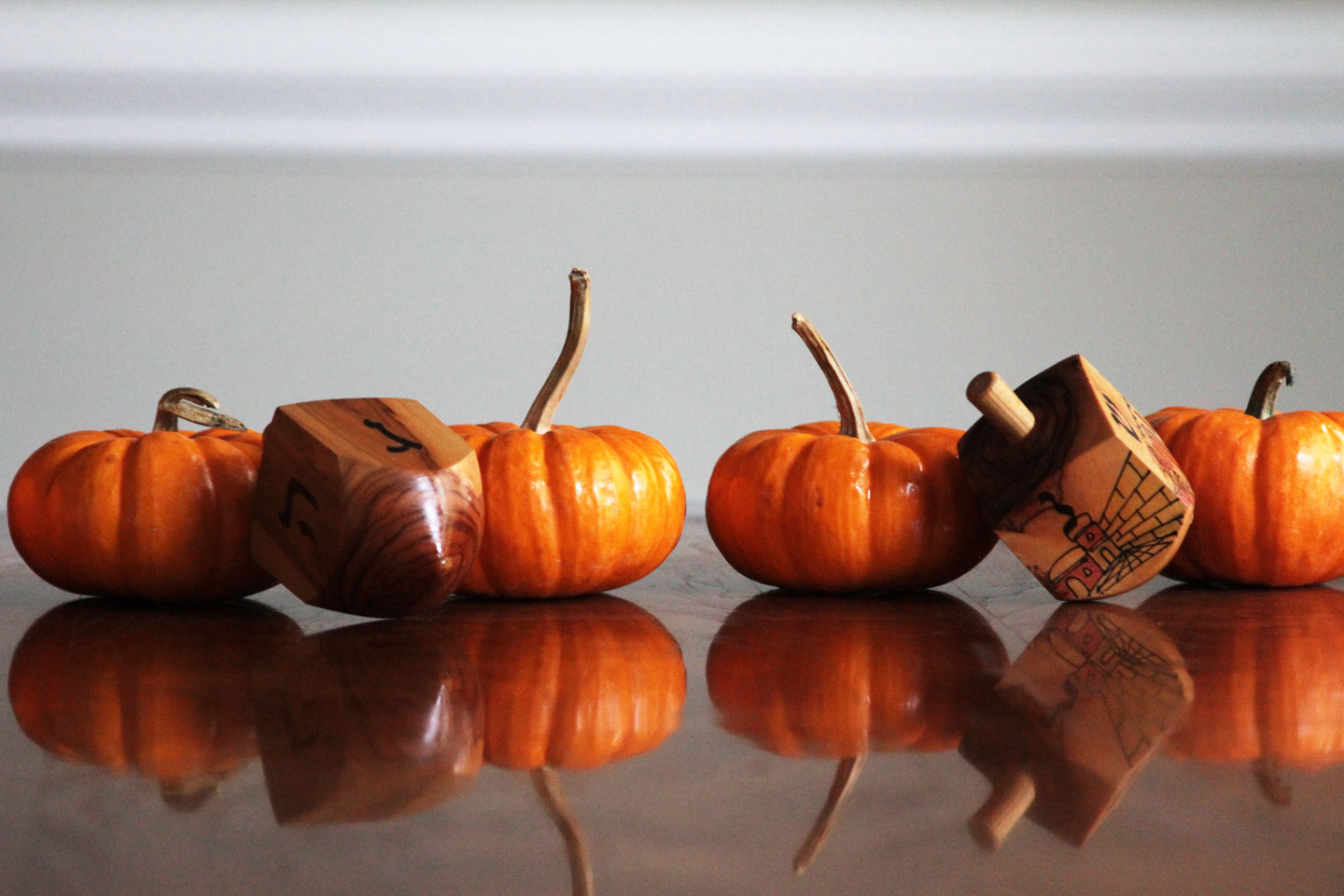It’s that time of the year. . .
It’s been heralded as the holiday of a lifetime.
Stranger things have happened in our kitchens, but it seems that the earth has turned and the stars have aligned to create a fusion of menus. What’s a cook to do as we prepare to celebrate the Jewish Festival of Oil together with the American Festival of Stuffing?
One mash up holiday meal
Any way you slice it, according to the convergence of our Jewish and secular (Gregorian) calendars, Chanukah and Thanksgiving won’t land on the same date again for another 70,000 years. So let’s make the best of it, setting our holiday tables as only Jews can and do . . . and feast to the max.
On the menu?
Blending the best of both frying and basting, mixing and stirring, we suggest:
Bubbe Knows Best Latkes with Cranberry Pomegranate Relish
Kosher Wine-Brined Turkey
Sage Dressing: Pumpkin Challah Day Stuffing with Chestnuts
Sweet Potato Kugel (No Marshmallows Please)
Roasted Root Vegetables: Parsnips, Carrots, Beets with Pickled Onion
Guiltless Gelt
Bubbe Knows Best Latkes: A Recipe
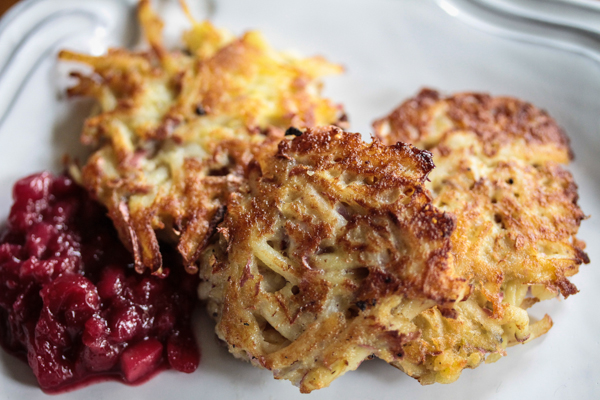
There’s nothing like a platter of potato pancakes to inspire excess and pure joy. Plain and simple, this recipe calls for measurement in pounds: as many potatoes as you could stand to grate, as many onions chopped as needed to bring tears streaming to your eyes, eggs and matzoh meal – enough to hold the ingredients together, salt and pepper enough to taste, and if you really want to give your Lipitor a workout, add a dollop of chicken fat to the potato mixture before frying, just enough to enhance that indescribably heavenly Jewish holiday flavor. (Hint: make ’em “mini” for Thanksgivukkah appetizers.)
A recipe to serve a crowd
- 3 pounds russet potatoes
- 6 large eggs, lightly beaten
- 2 large onions, grated
- ¾ cups matzoh meal (or panko bread crumbs for extra crispy)
- 2 tablespoons sugar
- 1 teaspoon salt
- 2 teaspoons ground pepper
- ¼ cup chicken fat (optional)
- ½ cup peanut oil (or more) for frying
Cranberry Pomegranate Relish
Here’s a Chanukah variation on a classic
- 1 package cranberries
- ½ red onion diced
- Seeds 1 pomegranate —
- ½ cup brown sugar or to taste
- ½ cup water
- ¼ orange juice
- ¼ cup brandy
- Pinch salt
In a sauce pan, combine ingredients and simmer until the mixture thickens.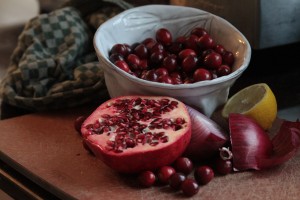
A brief history of Jewish time
On the Jewish calendar, Chanukah comes up reliably on the same date each year. On the secular calendar, the dates move from year to year, most commonly falling in December.
Given that the Jewish calendar repeats on a 19-year cycle, and Thanksgiving repeats on a 7-year cycle, you would expect the holidays to coincide roughly every 19×7 = 133 years.
According to calculations by Jonathan Mizrahi, a quantum physicist at the Sandia National Laboratories in New Mexico, the overlap of the two holidays would have happened only once before in 1861. However, Thanksgiving was only formally established by President Lincoln in 1863. So, it has never happened before.
And essentially, we’ll wait an eternity before it happens again. Why?
Mizrahi explains: The Jewish calendar is very slowly getting out of sync with the secular calendar, at a rate of 4 days per 1,000 years. (Not bad for a many centuries old calendar!) This means that while presently Chanukah can be as early as 11/28, over the years the calendar will drift forward, such that the earliest Chanukah can be is 11/29. The last time Chanukah falls on 11/28 is 2146 (which happens to be the Monday after Thanksgiving).
Of course, if the Jewish calendar is never modified in any way (which by Jewish Law it would be required to modify to keep Passover in the spring), then it will slowly move forward through the secular calendar, until it loops all the way back to where it is now. So, Chanukah will again fall on Thursday, 11/28…in the year 79,811. So go figure.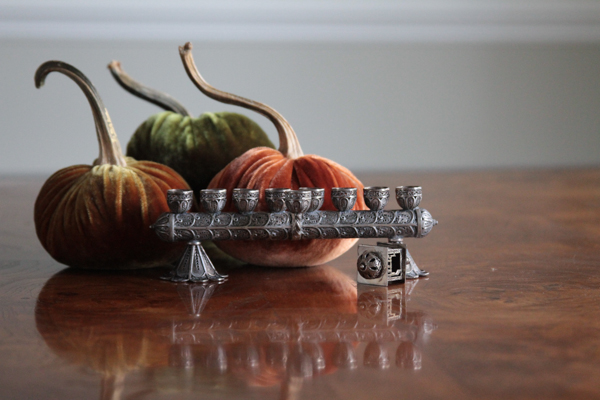
Let’s Talk Turkey: About the Chanukah Holiday Take-Over
Technically, let’s be clear, the first night and first candle lighting of Chanukah is Wednesday, November 27th.
This year’s calendar fluke placing the first day of Chanukah on the same day as Thanksgiving has given rise to some crazy notions that Chanukah is taking over the menu, the Parade and the true “American” spirit of the day.
Not so. According to Jeffrey Lasday, Director of Federation’s Alliance for Jewish Education, Chanukah and Thanksgiving have worked together to eclipse the original Jewish Harvest Festival of Sukkot – a sadly-neglected eight-day holiday which in fact traces its beginnings to the Book of Leviticus (23:39-43).
“When you have gathered in the yield of your land, you shall observe the festival of the Lord to last seven days; a complete rest on the first day and a complete rest on the eighth day.”
For hundreds of years in Temple times, the Jewish people observed Sukkot by traveling to Jerusalem for eight days of celebration, camping out in Sukkot (booths/huts) around the Temple. Sukkot ruled! That is until . . . the Maccabees.
We all know the story: In 168 B.C.E., the Syrian Greeks take over the Temple in Jerusalem and forbid observance of Jewish rituals including the holiday of Sukkot. A war breaks out for religious freedom. The Maccabees (the good guys) wage battle against the Syrian Greeks (the bad guys). Due to the war, the Jews are unable to get to Jerusalem to celebrate Sukkot. Finally the Maccabees vanquish the Syrian Greeks and are able to regain the Temple in Jerusalem. The first thing that the Maccabees do when they win back the Temple according to the Second Book of Maccabees is to celebrate the eight-day holiday of Sukkot.
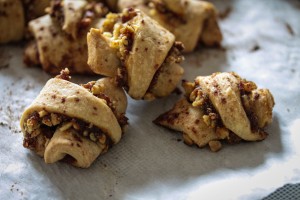
As Jeff goes on to explain, “This victory over the Syrian Greeks becomes known as Chanukah (dedication) in remembrance of the rededication of the Temple. However, Chanukah goes on to shine, stealing the limelight from Sukkot. Sukkot’s critical role in the rise of the Maccabees and Chanukah is forgotten. But then . . . the Pilgrims come to America.
Like the Maccabees before them, the Pilgrims turn to the Bible and draw inspiration for a new holiday from Sukkot. Both Sukkot, the Jewish Feast of Tabernacles and Thanksgiving celebrate the fall harvest. Once again, Sukkot serves only the inspiration. The rest, as they say is history . . . as the turkey, the stuffing, the candles, the dreidel-spinning, the candle-lighting, the NFL Games, and the gelt all go on to show.
From our family to yours . . . Happy Challah Days.

